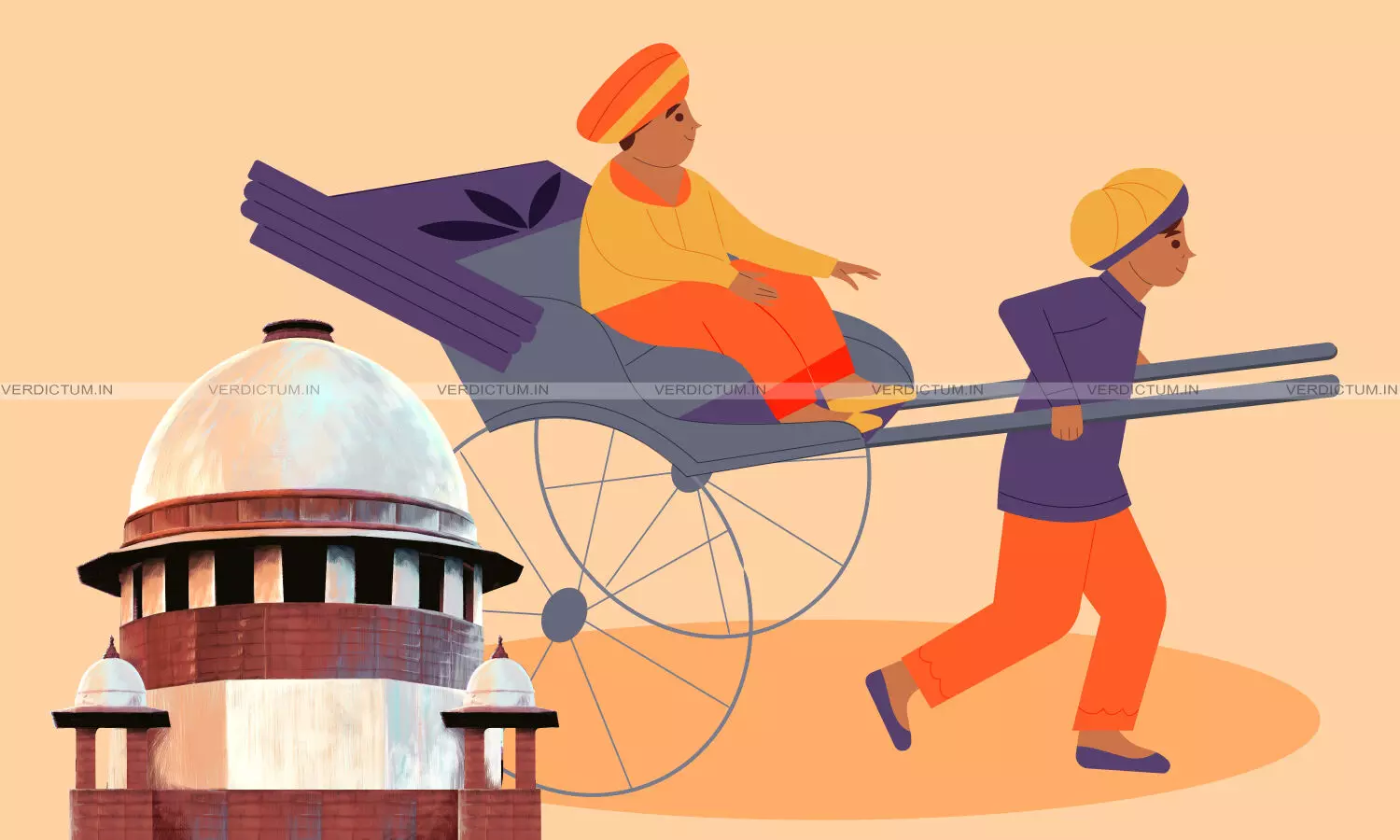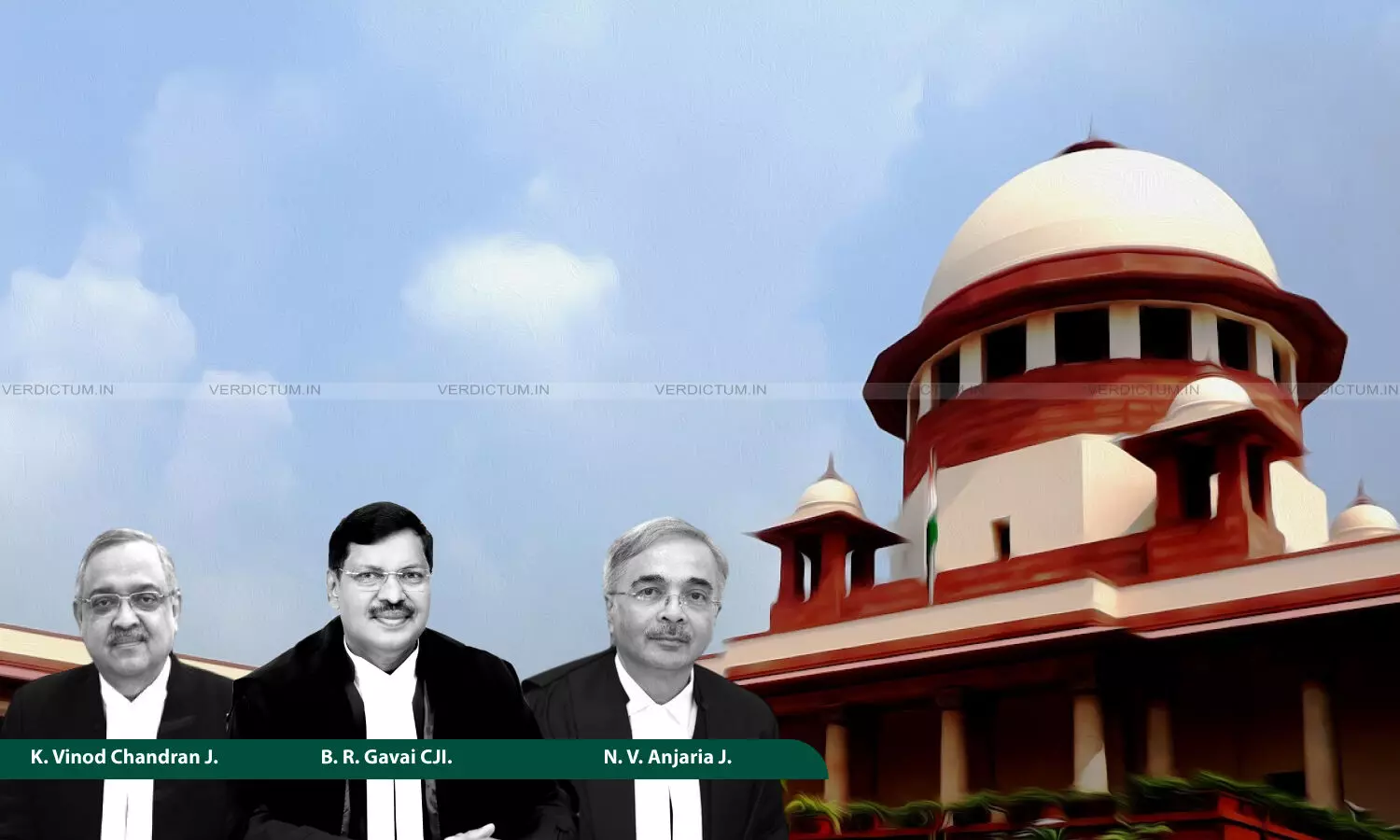
“Inhuman Practice”: Supreme Court Directs Maharashtra Govt To Stop Practice Of Plying Hand-Pulled Carts Or Rickshaws In Matheran
 |
|The Supreme Court remarked that the inhuman practice of a human being towing other human beings is still very much prevalent in the town of Matheran.
The Supreme Court has directed the State of Maharashtra to immediately stop the practice of plying hand pulled carts/rickshaws in the town of Matheran.
Matheran is one of the most popular hill stations in Maharashtra, Raigad District, which is situated in the biologically rich Western Ghats, and is now recognized as an eco-sensitive region.
The three-Judge Bench comprising Chief Justice of India (CJI) B.R. Gavai, Justice K. Vinod Chandran, and Justice N.V. Anjaria held, “The persons towing hand cart/rickshaw in Matheran do so not of their own choice but since they have no other source of livelihood. Permitting such an inhuman practice, which hits the concept of human dignity in a country like India, which is marching towards becoming a developed country from a developing country, belittles the constitutional promise of social and economic justice.”
The Bench remarked that even after 45 years of the observations made in Azad Rickshaw Pullers’ Union and Others v. State of Punjab and Another (1980), the inhuman practice of a human being towing other human beings is still very much prevalent in the town of Matheran.
“The question that we will, therefore, have to ask ourselves is as to whether we, as a society, are alive to the constitutional promise of social and economic equality and social and economic justice. … The answer, unfortunately, will have to be in the negative”, it added.
Senior Advocate K. Parameshwar assisted the Court as an Amicus Curiae. Senior Advocate Shyam Divan and Advocate Nina Nariman appeared for the owners/the persons dependent on horses for their livelihood. Senior Advocate Colin Gonsalves appeared for the hand cart/rickshaw pullers. Advocate Siddharth Dharmadhikari appeared for the State.

Background
Matheran is a home to several species of flora and fauna, including the bonnet macaque, Hanuman langur, Malabar giant squirrel, barking deer, and various endemic orchids, etc. It has a permanent population of approximately about 4,400 persons, as per the 2011 Census. However, apart from the permanent population, the region also sees the inflow of large number of tourists throughout the year and specially during summer. Lately, the monsoon tourism has also become quite popular in Matheran, when the tourists go to enjoy the monsoon of Matheran. The approximate foot fall of the tourists is around 8 lakhs in a year. Matheran has been known for its uniqueness, inasmuch as it is recognized as the only pedestrian hill station.
In 2000, the State Government communicated its in-principle approval to the Government of India to declare Matheran as an Eco Sensitive Zone (ESZ). In 2001, the Supreme Court expressly restricted all vehicular traffic in the region, except for an ambulance and a fire engine and thereafter in 2002, a draft notification was published. The Matheran Municipal Council (MMC) made an application to the Court to stop the practice of hand pulled carts/rickshaws being plyed on the road. The matter was pending for last couple of years on the issue whether the paver blocks should be permitted to be laid on the road between Dasturi Naka to Shivaji Maharaj Statue and as to whether hand pulled carts/rickshaws be replaced with e-rickshaws. In the meantime, an issue as to whom the e-rickshaws have to be allotted also arose.
Court’s Observations
The Supreme Court in the above regard, observed, “Time and again, we have observed that this Court cannot sit in an appeal over the wisdom of experts. The two expert bodies i.e., IIT, Bombay and NEERI have examined the issue and found that laying of paver blocks was necessary to arrest the soil erosion. They also found that the paver blocks is the best solution.”
The Court, therefore, accepted the recommendation of the IIT, Bombay and NEERI that the laying of clay paver blocks is a best solution for arresting the soil erosion.
“It can thus be seen that this Court in the said case had an occasion to consider the effect of Article 23 of the Constitution of India, which prohibits traffic in human beings and forced labour. The Court found that with the new egalitarian socio economic order which “we the people of India” were determined to build; forced labour, in whatever form, is violative of human dignity and is contrary to the human order. The Court gave an expanded meaning to Article 23 and held that Article 23 intended to abolish every form of forced labour. The Court also found that even if remuneration is paid, labour supplied by a person would be hit by Article 23, if it is a forced labour i.e., labour supplied not willingly but as a result of force or compulsion”, it noted.
The Court said that continuing such an inhuman practice even after 78 years of the country getting its freedom and after 75 years of the Constitution being enacted and promising social and economic justice to its citizens, would be betraying the promise given by the people of India to themselves.
“We, therefore, find that the practice of permitting hand pulled carts/rickshaws needs to be stopped forthwith. At the same time, the question that would arise next is, if we stop this practice what will happen to those who are dependent on it for their livelihood”, it added.
The Court emphasised that the State which has also a duty under the Directive Principles of State Policy (DPSP) to ensure that social and economic justice is done to the citizen, should form a scheme for rehabilitation of these hand cart/rickshaw pullers so that they are not deprived of their livelihood.
“We, therefore, find that it will be appropriate that the State of Maharashtra studies the said scheme and implements the same in the town of Matheran so that not only the genuine hand cart/rickshaw pullers are rehabilitated but also the other underprivileged persons in and around the town of Matheran, including the Adivasi women, are benefited therefrom”, it further noted.
Directions
The Court also issued the following directions –
(i) The State Government is permitted to lay the clay paver blocks on the road between the Dasturi Naka to Shivaji Maharaj Statue.
(ii) Though the clay paver blocks would be permitted to be laid on the road between Dasturi Naka to Shivaji Maharaj Statue, no paver blocks would be laid on the internal roads and in no case on the trekking routes.
(iii) The State of Maharashtra shall forthwith stop the practice of plying hand pulled carts/rickshaws in the town of Matheran in a phased manner and in any case within a period of six months.
(iv) The State Government shall evolve a scheme taking the scheme applicable in Kevadia to be a model scheme.
(v) Insofar as the identification of the genuine hand cart/rickshaw pullers is concerned, since many flaws have been found by the Principal District Judge, Raigad in his inquiry and since Senior Advocate Gonsalves is not satisfied with the modus operandi of the State Government, the Matheran Monitoring Committee under the Chairmanship of the Collector, Raigad, which is constituted under the ESZ Notification, shall identify the persons who are genuine hand cart/rickshaw pullers.
(vi) The State Government would be at liberty to implement the aforesaid scheme through Corporate Social Responsibility (CSR) Funds or any other mode available to it.
(vii) While undertaking aforesaid exercises, the State Government and relevant authorities shall ensure that the character of Matheran as a pedestrian hill station, which is unique to the town of Matheran, shall be maintained to the extent possible.
Accordingly, the Apex Court disposed of the batch of Applications and issued necessary directions.
Cause Title- In Re: T.N. Godavarman Thirumulpad v. Union of India and Others (Neutral Citation: 2025 INSC 996)